In contemporary times, the world is changing in all aspects, and not all change is positive. With the pandemic accelerating this change, millions of people have been affected adversely. The United Nations (UN) defines Climate Change as "the long-term shifts in temperatures and weather patterns. These shifts may be natural, such as through variations in the solar cycle. But since the 1800s, human activities have been the main driver of climate change, primarily due to burning fossil fuels like coal, oil, and gas."
The impact of Climate Change is multifold. It leads to hotter temperatures, more severe storms, loss of plant and animal species, changes in the ocean levels, increased droughts, floods, and excessive rainfall being few among many others. The likely expected effects of global climate change involve more frequent wildfires, extended periods of drought in some regions, and an increase in the number, duration, and intensity of tropical storms.
Climate change can affect human health, ability to grow food, housing, safety, and work. Ocean levels are not only rising, but the water temperatures are also increasing. From polar bears in the Arctic to marine turtles off the coast of Africa, our planet's diversity of life is at risk from climatic changes. Longer, more serious droughts threaten crops, wildlife, and freshwater supplies. A warming ocean causes thermal stress that contributes to coral bleaching and infectious diseases.
The growing human interference with natural resources is, in turn, proving to be disastrous for survival. Natural disasters caused by incessant rainfall, earthquakes, droughts are making their way to the headlines every day. The UN has declared that Climate change is the single biggest health threat facing humanity. The impacts are already harming health through air pollution, disease, extreme weather events, forced displacement, food insecurity, and pressures on mental health. Every year, environmental factors take the lives of around 13 million people.
Droughts, floods, and extreme temperatures can lead to crop losses and endanger the sustenance of agricultural producers and the food security of communities worldwide. Depending on the crop and ecosystem, weeds, pests, and fungi can also thrive under warmer temperatures, wetter climates, and increased CO2 levels, and climate change will likely increase weeds and pests.
Sustainable Development Goals (SDGs)
The Sustainable Development Goals (SDGs), also known as the Global Goals, are a universal call to action to end poverty, safeguard the environment, and secure peace and prosperity for all people. The 17 SDGs are interconnected, recognizing that actions in one area have an impact on outcomes in others and that development must strike a balance between social, economic, and environmental sustainability.Child Help Foundation aligns its Programs in accordance with the UN's SDGs:
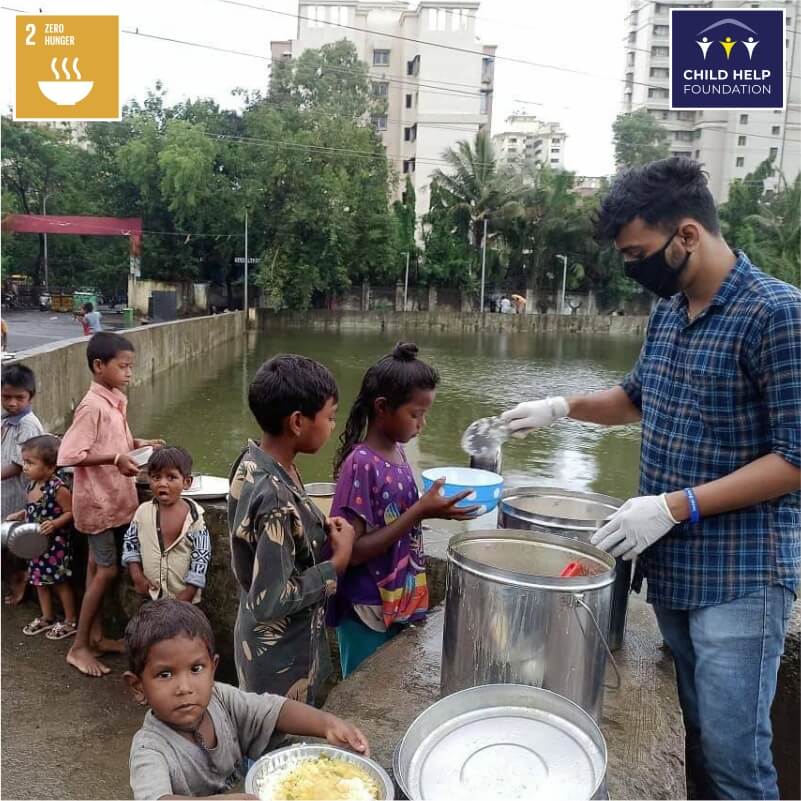
SDG 2: Zero Hunger
The 2nd Goal towards sustainability is to create Zero Hunger, which means, to end hunger, achieve food security and improved nutrition and, promote sustainable agriculture. According to the UNDP India, the number of undernourished people reached 821 million in 2017. Child Help Foundation is working towards ensuring that the lesser privileged do not miss out on their required nutritional needs. We provide warm, nutritious meals to 1,800 individuals every day.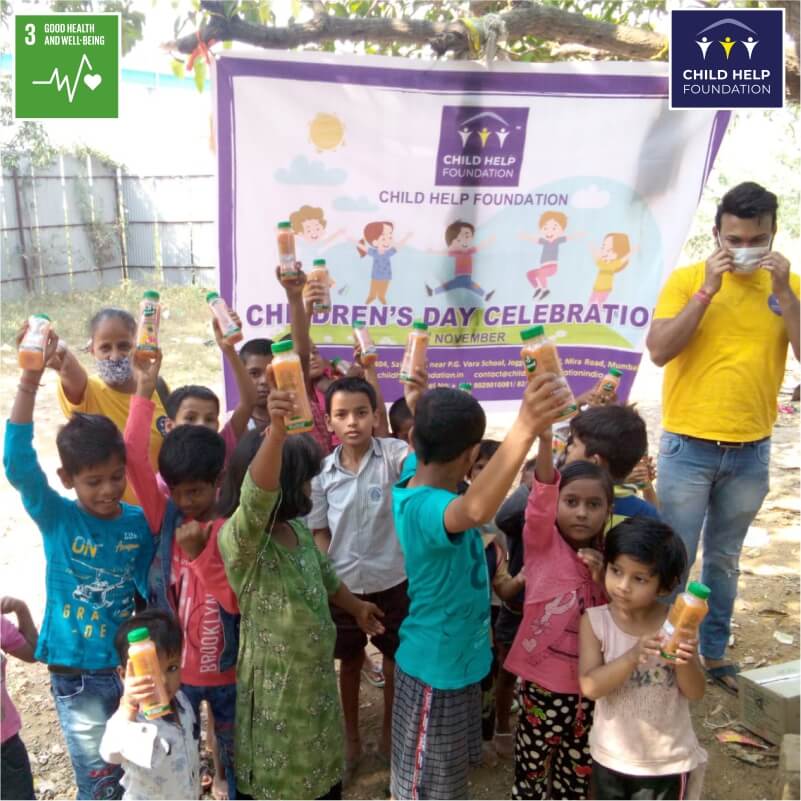
SDG 3: Good Health and Well-being
SDG 3 is working towards assuring healthy lives and promoting well-being at all ages, as it is essential to sustainable development. Good Health and Well-Being are all about ensuring healthy lives and promoting welfare among people of all ages. The target plan of SDG3 is to prevent the death of newborns and children by the year 2030. These goals are ingrained in the missions and initiatives of the non-profit organizations working for children. Child Help Foundation (CHF) is at the forefront in carrying out activities and initiatives focussed on ensuring wellness among children and enhancing their health. Our Emergency Medical Support Program is our flagship program, through which we are committed to saving the lives of many underprivileged children. Child Help Foundation supports the treatment of children from poor economic backgrounds, thus bringing smiles to family members and saving the lives of children.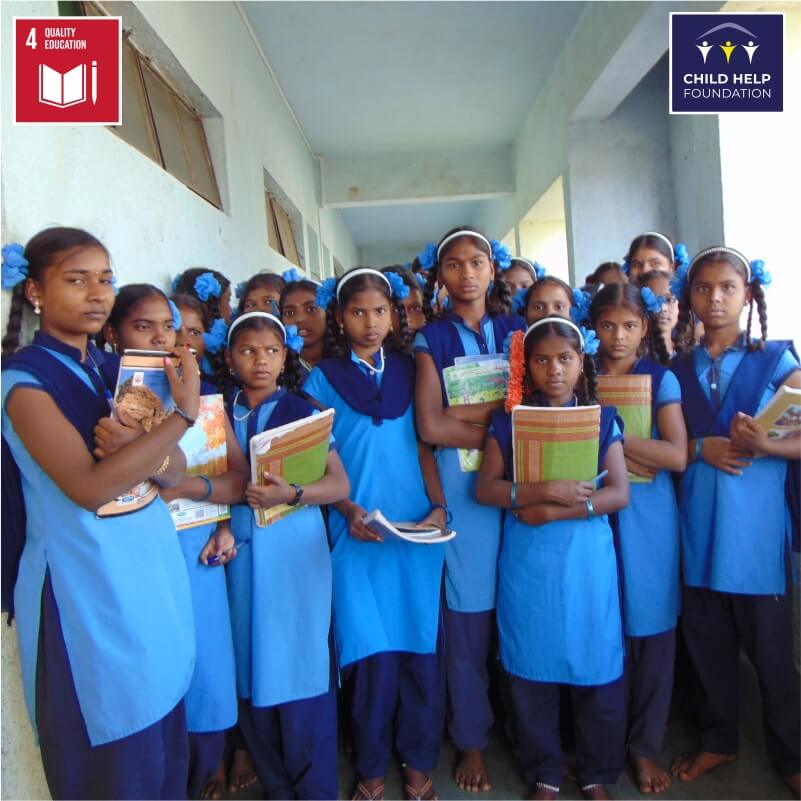
SDG 4: Quality Education
According to SDG4, education facilitates upward socioeconomic mobility and is a key to escaping poverty. Over the past decade, major progress was made towards increasing access to education and school enrollment rates at all levels, particularly for girls. In India, around 35 million children aged 6 - 14 years do not attend school. 53% of girls in the age group of 5 to 9 years are illiterate. Under the Inclusive Education program, Child Help Foundation has been promoting primary education among disadvantaged children. Over the years, we have supported students from economically weaker families with scholarships to complete their education. The parents of these kids usually work as daily wage laborers or are domestic workers. Many of them approach CHF seeking help for their child's educational future. The CHF team ensures a proper background check, by visiting these houses, before granting aid, so that our initiative reaches the grassroots level.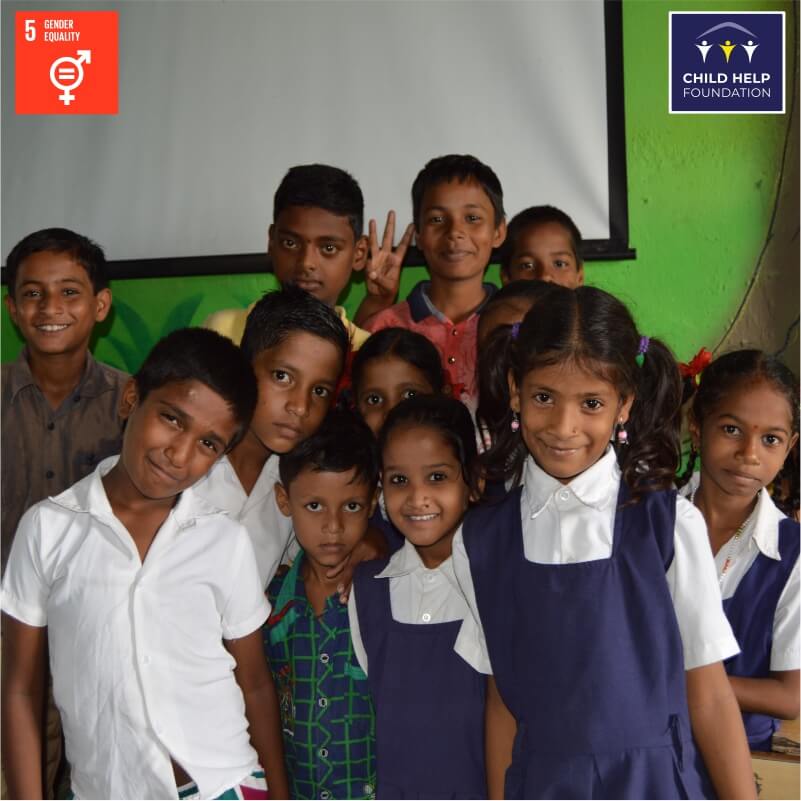
SDG 5: Gender Equality
The UN states that gender equality is not only a fundamental human right but a necessary foundation for a peaceful, prosperous and sustainable world. Violence against women is widespread in India, prohibits educational attainment and earnings potential, and has significant economic and social costs. In India, as per the latest National Family Health Survey (NFHS) 2015-16, 29.5% of women have experienced physical violence since age 15, and 21.2% have experienced physical violence in the 12 months preceding the survey. To date, many girl students are made to drop out of schools, hindering them from attaining education. Child Help Foundation (CHF) is working towards creating an equal platform for both boys and girls in the community. Our goal is to promote the education of the girl child. Our Gender Equality Program is aligned with the National Program ‘Beti Padhao, Beti Bachao’. Our grassroots level programs are eliminating gender biases and creating a level playing field for both boys and girls. We believe that women need to be empowered to stand up for their Fundamental as well as Human Rights.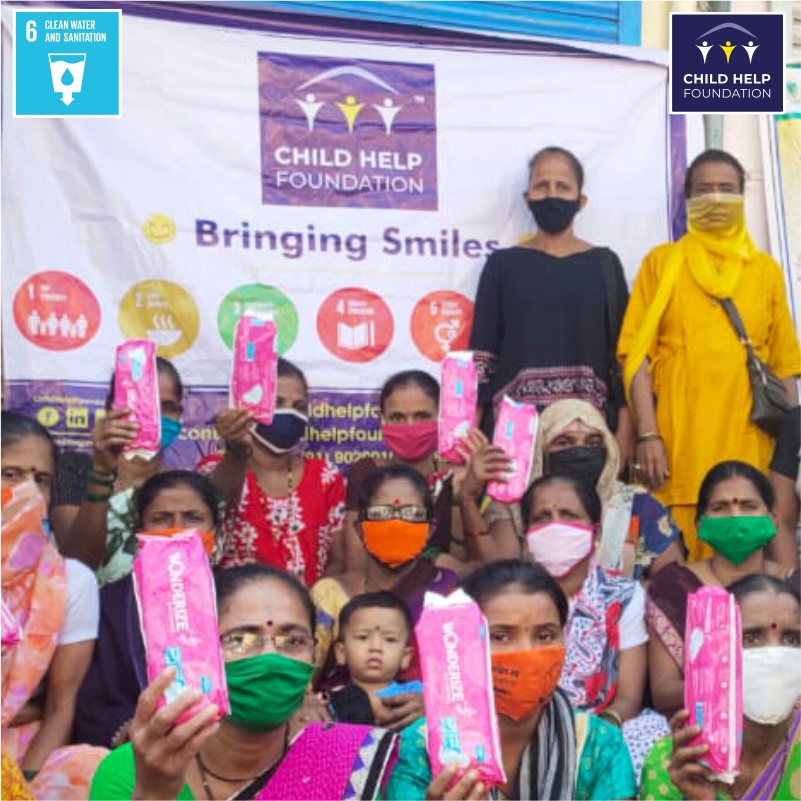
SDG 6: Clean Water and Sanitation
SDG 6 stands for ensuring availability and sustainable management of water and sanitation for all. Open defecation and communicable waterborne disease are highly concerning in India. Water relates to 21 percent of diseases in India. Around 99 million people have no access to safe water and 500 children in India each day cannot survive through their fifth year on the earth due to diarrheal disease. At least 50 percent of sanitation structures remain unused or not used properly. Many women (300 million) have no or limited access to safe bathrooms. In some extreme cases, the problem puts females’ life at stake because of the unfamiliarity of toilet facilities. Child Help Foundation (CHF) has been working towards providing girls and women from impoverished areas have access to menstrual hygiene materials like sanitary napkins and clean washrooms. Awareness sessions regarding the do’s and don’ts during menstruation are also given to the girls and women. They are helped with their queries relating to menstruation and safe menstrual hygiene practices. CHF's Menstrual Hygiene Management (MHM) Program works towards bettering the health of adolescent girls and women. CHF also has been active in constructing toilets and urinals for many schools from tribal and rural areas across India.SDG 11: Sustainable Cities and Communities
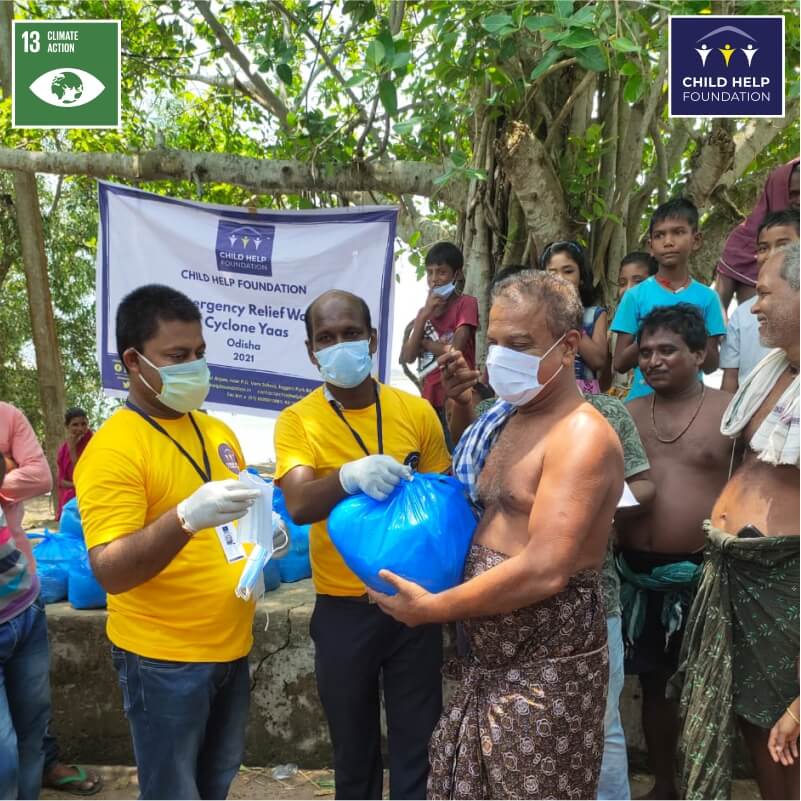
SDG 13: Climate Action

SDG 17: Partnership for the Goals
SDG 11 talks about making cities sustainable by creating career and business opportunities, safe and affordable housing, and building resilient societies and economies. SDG 13 intends to take measures against Climate Change by taking efforts to integrate disaster risk measures, sustainable natural resource management, and human security into national development strategies. SDG 17 aims at dealing with humanitarian crises with strong global partnerships and cooperation. Child Help Foundation (CHF) under its Humanitarian Relief initiative, has incorporated three Sustainable Development Goals (SDGs) of the UN - SDG 11, 13, and 17. CHF has been at the forefront in responding to the damage caused by natural calamities. During the devastation caused by multiple natural disasters in the country, like floods, droughts, earthquakes, and landslides, CHF reached out to provide immediate relief to the affected victims.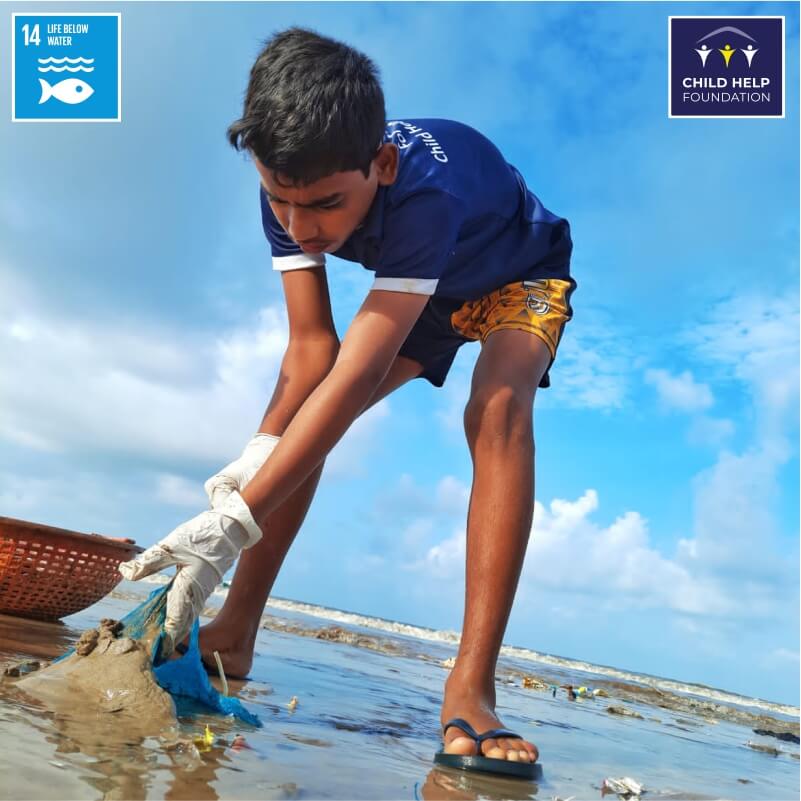
SDG 14: Life below Water
Life below Water is working towards conserving and sustainably using the oceans, sea, and marine resources for sustainable development. Over three billion people depend on marine and coastal biodiversity for their livelihoods. However, today the world is seeing 30 percent of the world’s fish stocks overexploited, reaching below the level at which they can produce sustainable yields. CHF began Beach Clean-Up programs to restore marine and coastal biodiversity. An imbalance in the two, can not only harm the flora and the fauna but also the human lives in the surroundings. We conduct beach cleanups regularly at multiple places.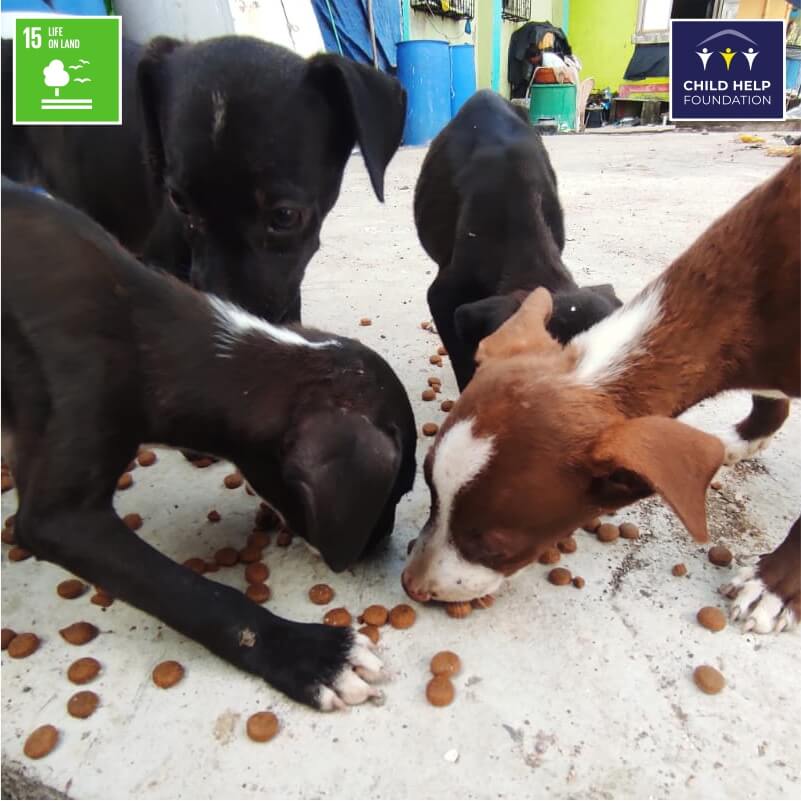
SDG 15: Life on Land
SDG 15 aims to protect, restore and promote sustainable use of terrestrial ecosystems, sustainably manage forests, combat desertification, and halt and reverse land degradation and halt biodiversity loss.Every year, 13 million hectares of forests are lost, while the steadfast depletion of drylands has led to the desertification of 3.6 billion hectares, disproportionately affecting poor communities.
Child Help Foundation has taken steps towards feeding and taking care of stray animals in multiple locations across India. Our purpose remains towards tending to the helpless strays who need to be fed and looked after. Our team of volunteers also conducts tree-plantation drives to achieve SDG-15.
By 2030, CHF aims to contribute towards a sustainable planet and create a difference. With your generous contributions and support, CHF continues to work towards achieving these goals. This is the time for us to come together as a country and a community to save our planet!
.jpg)